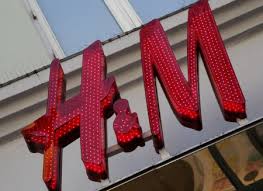
After missing quarterly profits estimates and projecting a decline in June sales, H&M raised doubts about its full-year profit margin objective on Thursday. This caused shares of the second-largest apparel retailer in the world to drop by over 14%.
According to the Swedish corporation, bad weather in numerous regions is a contributing factor in the expected 6% local currency decline in sales this month compared to the same period last year.
CEO Daniel Erver said during a press conference, "It's mainly connected to Europe where the weather has a significant impact on our short term trading."
Erver stated that although it was now more difficult to achieve, H&M remained committed to its 2024 operating margin target of 10%.
"External factors that influence our purchasing costs and sales revenues, including materials and foreign currency, will have a more negative impact than we expected in the second half," he said.
"The most important prerequisite for achieving our goal is that sales growth is further strengthened in the second half of the year compared with the second quarter increase."
According to Erver, the firm gave away less product discounts in June, which was a bad move for the month but a portent of things to come.
He said, "H&M intends to increase sales by providing slightly larger discounts in the second half of the year."
Based on Thursday's report, analysts are expected to reduce their full-year projections for H&M's profits per share by 1-2%, according to a note provided to clients by brokerage DNB Markets.
While China-founded fast-fashion business Shein is swiftly expanding in Europe and planning a London stock market offering, H&M has frequently lagged behind Inditex, the company that owns Zara.
H&M's stock was down 13.2% at 0940 GMT, having dropped over 14% at market open. This was on course to be the company's worst day since 2001 and the worst performance in the pan-European STOXX 600 index.
The stock has increased by 9% over the past year, far less than Inditex's 35% gain.
JPMorgan described the update as unsatisfactory.
"We .... indeed think that the June sales and margin commentary could weigh on the wider sector," added the broker.
Since inflation has reduced the spending power of its core customer base of cost-conscious buyers, H&M has found it difficult to win back customers.
According to the Swedish firm, net sales increased 3% in local currency during the second quarter of March–May compared to the same period last year. Growth was observed across all client groups and all areas.
Operating profit increased to 7.1 billion Swedish crowns ($672.5 million) from 4.74 billion the previous year, but it was still less than the average expert prediction of 7.37 billion in an LSEG survey.
(Source:www.business-standard.com)
According to the Swedish corporation, bad weather in numerous regions is a contributing factor in the expected 6% local currency decline in sales this month compared to the same period last year.
CEO Daniel Erver said during a press conference, "It's mainly connected to Europe where the weather has a significant impact on our short term trading."
Erver stated that although it was now more difficult to achieve, H&M remained committed to its 2024 operating margin target of 10%.
"External factors that influence our purchasing costs and sales revenues, including materials and foreign currency, will have a more negative impact than we expected in the second half," he said.
"The most important prerequisite for achieving our goal is that sales growth is further strengthened in the second half of the year compared with the second quarter increase."
According to Erver, the firm gave away less product discounts in June, which was a bad move for the month but a portent of things to come.
He said, "H&M intends to increase sales by providing slightly larger discounts in the second half of the year."
Based on Thursday's report, analysts are expected to reduce their full-year projections for H&M's profits per share by 1-2%, according to a note provided to clients by brokerage DNB Markets.
While China-founded fast-fashion business Shein is swiftly expanding in Europe and planning a London stock market offering, H&M has frequently lagged behind Inditex, the company that owns Zara.
H&M's stock was down 13.2% at 0940 GMT, having dropped over 14% at market open. This was on course to be the company's worst day since 2001 and the worst performance in the pan-European STOXX 600 index.
The stock has increased by 9% over the past year, far less than Inditex's 35% gain.
JPMorgan described the update as unsatisfactory.
"We .... indeed think that the June sales and margin commentary could weigh on the wider sector," added the broker.
Since inflation has reduced the spending power of its core customer base of cost-conscious buyers, H&M has found it difficult to win back customers.
According to the Swedish firm, net sales increased 3% in local currency during the second quarter of March–May compared to the same period last year. Growth was observed across all client groups and all areas.
Operating profit increased to 7.1 billion Swedish crowns ($672.5 million) from 4.74 billion the previous year, but it was still less than the average expert prediction of 7.37 billion in an LSEG survey.
(Source:www.business-standard.com)














